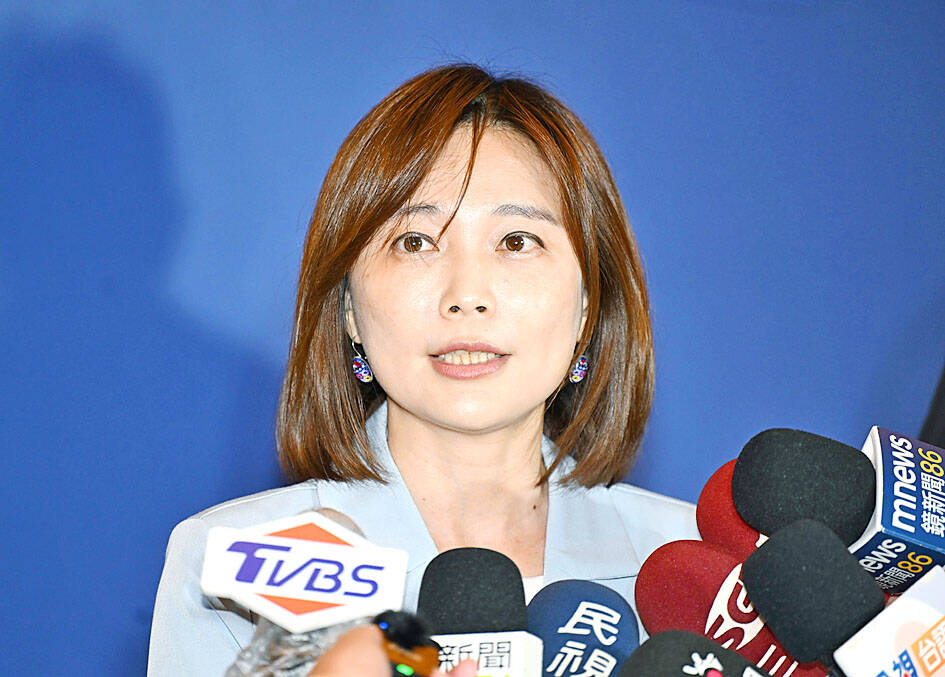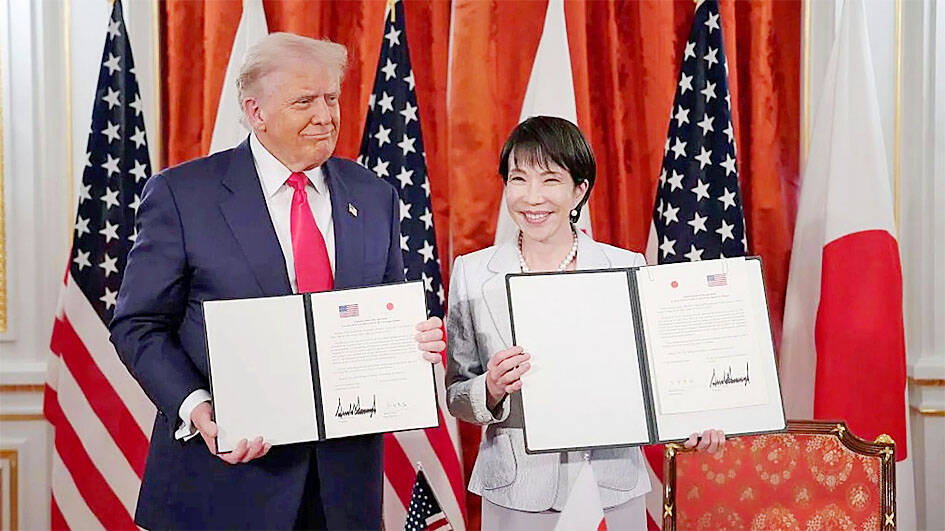Minister of Foreign Affairs Lin Chia-lung (林佳龍) yesterday thanked US President Donald Trump and Japanese Prime Minister Sanae Takaichi for supporting peace in the Taiwan Strait, a day after the two at a summit in Tokyo emphasized the importance of regional stability and ahead of a meeting between Trump and Chinese President Xi Jinping (習近平) in South Korea today.
The previous day’s meeting was the first time Takaichi had met with the US leader since becoming Japanese prime minister, the Ministry of Foreign Affairs said in a statement.
Since taking office on Tuesday last week, Takaichi has urged the international community to maintain cross-strait stability and check authoritarian expansion, the ministry said, citing her speeches at the ASEAN summit and the East Asia Summit in Malaysia this week, and her meeting with Trump.

Photo: Chang Chia-ming, Taipei Times
Her announcements demonstrated Japan’s “firm position on urging the international community to prioritize cross-strait peace,” which plays an integral role in global security and prosperity, the ministry said.
“As a responsible member of the Indo-Pacific region, Taiwan is committed to enhancing its self-defense capabilities,” it said.
Taiwan would “defend the freedom, openness, peace, and prosperity of Taiwan and the Indo-Pacific” region with Japan and other like-minded countries, it added.

Photo:Reuters
Separately, the Presidential Office said that Taiwan welcomes dialogue that could reduce regional tensions ahead of the Trump-Xi meeting.
The government views with positivity any efforts aimed at decreasing the risks of military conflict and facilitating peaceful development in the region, Presidential Office spokeswoman Karen Kuo (郭雅慧) told reporters.
Taiwan is especially thankful for Washington’s support for Taiwanese security and democracy, as demonstrated by statements by US officials at the UN General Assembly and the US-Japan-South Korea joint declaration, Kuo said.
During his summit with Takaichi, Trump reiterated the importance of peace and stability in the Taiwan Strait, and US opposition to attempts to unilaterally change to the “status quo,” Kuo said.
The US and Japanese leaders’ comments were affirmations that the international consensus about Taiwan still holds, she said, adding that the nation communicates closely with the Trump administration.
Taiwan continues to work with Washington to maintain peace and stability in the Strait and the Indo-Pacific region, she said.
In related news, National Security Bureau Director-General Tsai Ming-yen (蔡明彥) said that the structural rivalry between the US and China would test Trump’s and Xi’s efforts today to moderate the competition between their nations.
The meeting is expected to revolve around topics concerning trade, economics and mechanisms governing a managed competition, Tsai said.
Washington and Beijing appeared to have adopted an approach to first handle fentanyl and exports of rare earths before confronting more difficult issues, he said.
The process would give Trump and Xi leeway to show some accomplishments to their domestic audiences, and cultivate an atmosphere of being positive and reasonable, he said.
However, the competition between the two nations stems from enduring structural issues, including clashing national security interests and technology controls that defy easy solutions, Tsai said.
Although the talks might broach geopolitical topics, US Secretary of State Marco Rubio has already assured the international community that Trump would not use Taiwan as a bargaining chip in negotiating with Xi, Tsai said.
Should issues concerning Taiwan become part of the talks, Trump’s advisers and staff would furnish him with the appropriate guidance, he said, adding that the bureau would closely observe the talks.
Additional reporting by Fang Wei-li

AGING: As of last month, people aged 65 or older accounted for 20.06 percent of the total population and the number of couples who got married fell by 18,685 from 2024 Taiwan has surpassed South Korea as the country least willing to have children, with an annual crude birthrate of 4.62 per 1,000 people, Ministry of the Interior data showed yesterday. The nation was previously ranked the second-lowest country in terms of total fertility rate, or the average number of children a woman has in her lifetime. However, South Korea’s fertility rate began to recover from 2023, with total fertility rate rising from 0.72 and estimated to reach 0.82 to 0.85 by last year, and the crude birthrate projected at 6.7 per 1,000 people. Japan’s crude birthrate was projected to fall below six,

US President Donald Trump in an interview with the New York Times published on Thursday said that “it’s up to” Chinese President Xi Jinping (習近平) what China does on Taiwan, but that he would be “very unhappy” with a change in the “status quo.” “He [Xi] considers it to be a part of China, and that’s up to him what he’s going to be doing, but I’ve expressed to him that I would be very unhappy if he did that, and I don’t think he’ll do that. I hope he doesn’t do that,” Trump said. Trump made the comments in the context

SELF-DEFENSE: Tokyo has accelerated its spending goal and its defense minister said the nation needs to discuss whether it should develop nuclear-powered submarines China is ramping up objections to what it sees as Japan’s desire to acquire nuclear weapons, despite Tokyo’s longstanding renunciation of such arms, deepening another fissure in the two neighbors’ increasingly tense ties. In what appears to be a concerted effort, China’s foreign and defense ministries issued statements on Thursday condemning alleged remilitarism efforts by Tokyo. The remarks came as two of the country’s top think tanks jointly issued a 29-page report framing actions by “right-wing forces” in Japan as posing a “serious threat” to world peace. While that report did not define “right-wing forces,” the Chinese Ministry of Foreign Affairs was

PREPAREDNESS: Given the difficulty of importing ammunition during wartime, the Ministry of National Defense said it would prioritize ‘coproduction’ partnerships A newly formed unit of the Marine Corps tasked with land-based security operations has recently replaced its aging, domestically produced rifles with more advanced, US-made M4A1 rifles, a source said yesterday. The unnamed source familiar with the matter said the First Security Battalion of the Marine Corps’ Air Defense and Base Guard Group has replaced its older T65K2 rifles, which have been in service since the late 1980s, with the newly received M4A1s. The source did not say exactly when the upgrade took place or how many M4A1s were issued to the battalion. The confirmation came after Chinese-language media reported